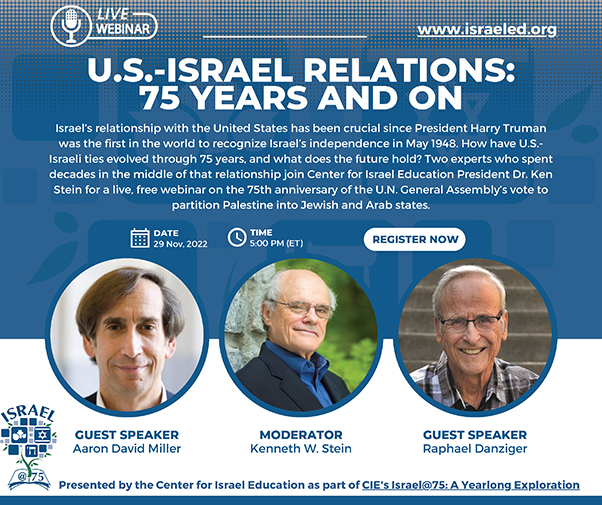U.S.-Israel Relations: 75 Years and On

This 52-minute Israel@75 webinar was recorded during a live stream Nov. 29, 2022, the 75th anniversary of the U.N. General Assembly’s approval of Resolution 181, calling for the partition of the British Mandate of Palestine into independent Jewish and Arab states with a special international status for Jerusalem.
Israel’s relationship with the United States has been crucial since President Harry Truman made the United States the first country in the world to recognized Israel’s independence in May 1948. Two experts and scholars who spent much of their careers in the middle of the U.S.-Israel relationship, Aaron David Miller and Raphael Danziger, join Center for Israel Education Founding President Ken Stein to discuss how those ties have evolved over 75 years and to examine what the future holds.
They address highs and lows in the relationship, how the special connections between the two countries has played a role in Middle East peace efforts, and how changes in the governments of both are affecting what have been close ties for more than half a century.
The following links provide more information on the topic:
• February 1948 — U.S. State Department gives reasons for opposing a Jewish state.
• 1922-November 2022 — American officials’ positive and negative remarks about Zionism, Israel, the U.S.-Israel relationship and resolving the Arab-Israeli conflict.
• May 2012 — Vice President Joe Biden remarks on U.S.-Israel relations.
• September 2020 — Abraham Accords, the U.S.-broked recognition agreements between Israel and the UAE and Bahrain.
• Itamar Rabinovich, “Testing the ‘Israel Lobby’ Thesis,” reprinted from The American Interest, March/April 2008, by permission of the author.
• Kenneth Stein, “A History of the US-Israeli Relationship,” Oxford Handbook of Israeli Politics and Society, November 2020, 49 pages, reprinted with permission of the author.
• Jim Zanotti, “Israel: Background and U.S. Relations in Brief,” Congressional Research Service, Washington, November 2022, 26 pages.
Panelists
Dr. Aaron David Miller
is a senior fellow focusing on U.S. foreign policy at the Carnegie Endowment for International Peace. He has written five books, including his most recent, The End of Greatness: Why America Can’t Have (and Doesn’t Want) Another Great President (Palgrave, 2014), and The Much Too Promised Land: America’s Elusive Search for Arab-Israeli Peace (Bantam, 2008). He received his Ph.D. in Middle East and U.S. diplomatic history from the University of Michigan in 1977. Between 1978 and 2003, he served at the State Department as a historian, analyst, negotiator, and adviser to Republican and Democratic secretaries of state and helped formulate policy on the Middle East and the Arab-Israel peace process.
Dr. Raphael Danziger
is a Middle East research consultant. He was AIPAC’s director of research and information from 1990 to 2010 and editor-in-chief of its Near East Report from 1992 to 2010, where he now has emeritus status. During the 1980s he was a foreign policy analyst at the American Jewish Congress. He previously taught modern Middle Eastern history at the University of Haifa and the University of Washington in Seattle. He was a visiting fellow at Princeton University and a consultant on Middle Eastern affairs at the Hudson Institute. He has published a book and many articles on the Middle East and North Africa, including in The New York Times. He holds a Ph.D. in Near Eastern studies from Princeton University.